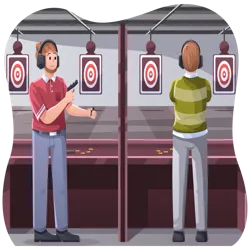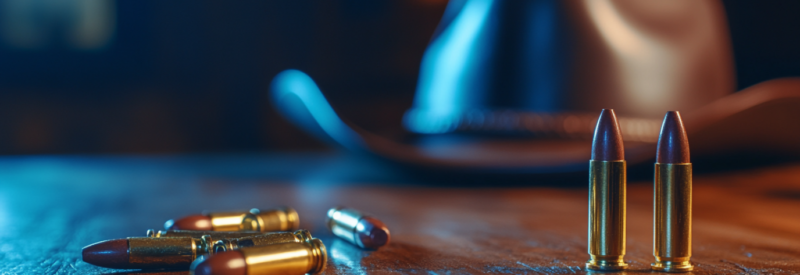
To legally sell firearms in Texas, you must obtain an FFL in Texas. And considering that U.S. gun sales continue to soar past pre-pandemic figures, there has never been a better time to sell firearms. This is particularly true of the firearms market in Texas, as the Lone Star state is home to the most registered weapons in the country. As previously stated, before legally selling guns in Texas, you must acquire a Texas FFL. Obtaining a Federal Firearms License (FFL) may feel like a monumental task.
Fortunately, this article walks you through the entire process of getting an FFL in Texas!
Getting a Texas FFL: An Introduction
A Federal Firearms License (FFL) is a government-issued license authorizing an individual or business to manufacture, import/export, or sell firearms in their business operations. Federal Firearms Licensees must comply with federal, state, and local laws regarding the manufacture, import/export, and sale of firearms.
Note: The acronym “FFL” may refer to a Federal Firearms License or a Federal Firearms Licensee.
Step 1: Meet All of the FFL Requirements
To obtain an FFL in Texas, you must meet the federal, state, and local requirements. You can find these requirements below.

Federal requirements
The Bureau of Alcohol, Tobacco, Firearms, and Explosives (ATF) regulates Federal Firearms Licenses at the federal level. These eligibility requirements do not vary by state, though states may enforce additional requirements. These state-issued requirements, as well as local and zoning requirements, result in variations of the FFL process by location.

State requirements
Beyond federal requirements, Texas’ only prerequisite is that you must register as a business in the state. As such, if you meet the federal requirements to obtain an FFL in Texas, you also meet the state requirements to get an FFL in Texas.
Many states require an additional license known as a state-level gun dealer license. Texas has no such requirement, making it easier to start a firearms business in the state.

Local and zoning requirements
In Texas, there are zoning restrictions with which firearms businesses must comply. For example, your business premises must be in a location not zoned for residential use. You must also display appropriate signage and lighting and make your business accessible to law enforcement.
As with any business, it’s essential to research all applicable local and zoning requirements. Doing so can ensure that you comply with all requirements and avoid any potential problems.
Step 2: Select the Type of FFL You Need
There are a few things to consider when choosing which type of Texas FFL you need:
- Type of firearms you wish to sell: If you only sell long guns, you only need a Type 01 FFL. However, if you also sell handguns, you need a Type 02 FFL.
- Your business model: Are you a brick-and-mortar store or an online retailer? Different business models may require different Federal Firearm Licenses.
- Regulations and restrictions applicable to having an FFL in Texas: There are many rules you need to follow to stay compliant. However, as long as you do your research and choose the proper license for your needs, you should be able to operate without any problems.

FFL license types
As per the ATF, there are nine types of Federal Firearms Licenses, which can be divided into three categories: dealer, manufacturer, and importer.
Dealer license types:
- 01 Type FFL: Dealer in Firearms Other Than Destructive Devices
- 02 Type FFL: Pawnbroker in Firearms Other Than Destructive Devices
- 09 Type FFL: Dealer in Destructive Devices
- 03 Type FFL: Collector of Curios and Relics
Manufacturer license types:
- 06 Type FFL: Manufacturer of Ammunition for Firearms Other Than Ammunition for Destructive Devices or Armor Piercing Ammunition
- 07 Type FFL: Manufacturer of Firearms Other Than Destructive Devices
- 10 Type FFL: Manufacturer of Destructive Devices, Ammunition for Destructive Devices or Armor Piercing Ammunition
Importer license types:
- 08 Type FFL: Importer of Firearms Other Than Destructive Devices or Ammunition for Firearms Other Than Destructive Devices, or Ammunition Other Than Armor Piercing Ammunition
- 11 Type FFL: Importer of Destructive Devices, Ammunition for Destructive Devices or Armor Piercing Ammunition
Step 3: Complete an Online FFL Course
Though not officially required, we recommend that those interested in becoming an FFL in Texas complete an online FFL course. Through RocketFFL’s two-hour Federal Firearms License course, you’ll learn valuable information that every firearms business owner should possess, such as how to track inventory and what types of firearms are eligible for sale. This course also covers laws and regulations related to selling firearms, so you can be sure you’re in compliance with all federal, state, and local requirements.
Step 4: Apply for Your Texas FFL
To apply for your FFL in Texas, you need to submit the following paperwork to the Bureau of Alcohol, Tobacco, Firearms, and Explosives (ATF):
- Federal Firearms License Application: To acquire an FFL, you must submit a completed Application for Federal Firearms License.
- Form 4473: The ATF uses Form 4473 to conduct a background check on individuals wishing to purchase firearms.
- Fingerprints: Your fingerprints are necessary to conduct a criminal background check.
- Photograph: Upon approval, your photograph will be used to create your FFL license.
- Certificate of Good Standing from the Texas Secretary of State: Available from the Texas Comptroller of Public Accounts, a completed Certificate of Good Standing is required for a Texas FFL.
Note: A Certificate of Good Standing may also be referred to as a “Certificate of Account Status.”
Step 5: Have an Interview with a Representative from Your Regional ATF Office
After you’ve submitted a completed application, your regional ATF office will arrange an in-person interview with you. The Industry Operations Investigator aims to verify that you understand and comply with laws related to selling, importing, and manufacturing guns. They will also inspect your business location to verify compliance.
How to Get a Class 3 SOT in Texas
If you’d like to sell items regulated under the National Firearms Act, you must also obtain a Special Occupation Tax (SOT) license in addition to a Federal Firearms License.
Much like Federal Firearms Licenses, there are multiple types of Special Occupation Taxpayer licenses available. A Class 1 SOT license grants you the authority to import NFA items; a Class 2 SOT grants you the authority to manufacture NFA items; and a Class 3 SOT grants you the authority to sell NFA items. That said, you need to obtain a Class 3 SOT license if you’d like to sell NFA items at your firearms business.
To obtain a Class 3 SOT in Texas, you must submit the Special Tax Registration and Return National Firearms Act (NFA) application to the ATF. You may submit this application electronically or print it and mail it to the address listed. If you submit it electronically, you must pay the license cost (ranging from $500-$1,000) via the online portal. If you mail your application, simply include a check for the license cost in the envelope.
Upon approval, the ATF will issue you a Class 3 SOT license, granting you the authority to purchase and sell NFA items.
FFL License Costs in Texas
The cost for an FFL ranges between $30 and $3,000, depending on the type of FFL you need. The ATF sets the cost for the initial FFL and its renewal. This cost does not vary by state.
Getting a Federal Firearms License in Texas: Closing Thoughts

Obtaining a Federal Firearms License in Texas is a relatively simple process. If you meet the listed requirements, complete the necessary forms, and pay the applicable fees, you should find it rather easy to acquire your Texas FFL. In fact, you may face a bigger challenge in finding a payment processing partner. But don’t let this stress you out! By partnering with a gun-friendly merchant services provider, finding a payment processor can be even easier than obtaining your Texas FFL!
Firearm Businesses Wanted!
Your troubles of getting approved for a merchant account are over.
Satisfaction
FFL Texas FAQs
Do I need an FFL in Texas?
Some people think they need an FFL in Texas in order to purchase a gun. However, this is not the case. If you are simply looking to purchase a gun for personal use, you will not need an FFL. However, if you plan to sell firearms in Texas, you must obtain a Texas FFL.
Who can apply for an FFL in Texas?
Anyone who meets the basic qualifications (see above) can apply for an FFL in Texas. In addition, applicants must demonstrate they are capable of complying with federal, state, and local laws related to firearms.
Do I need to register as a business to get a Texas FFL?
Yes. To obtain a Texas FFL, you must register your business with the State of Texas. Once registered, you will also need to register your business with the Bureau of Alcohol, Tobacco, Firearms, and Explosives (ATF).
How can I find an FFL dealer in Texas?
There are a few methods of finding an FFL dealer in Texas. The most reliable way of finding an FFL dealer in Texas is by searching the ATF directory. Maintained by the ATF, this list of licensed dealers is searchable by zip code.
You may also locate an FFL dealer in Texas via other online directories, though other directories tend to be less reliable than the ATF. As such, you should confirm that any FFL dealer in Texas found through other directories is in possession of a current license.
Finally, you may ask your friends, family, and other members of your community if they know any FFL dealers in Texas.
Can you have a home-based FFL in Texas?
In Texas, you may obtain an FFL for a home-based firearms business. However, you must meet certain requirements. For example, you must have a physical location for your business, such as a workshop or office space. You must also provide the ATF with a detailed description of your business premises and its security features. In addition, you must comply with state and local laws related to firearms businesses. If you can meet these requirements, you should be able to obtain an FFL for your home-based business in Texas.
Can I apply for an FFL with a Texas gun trust?
No. You cannot apply for a Texas FFL with a Texas gun trust.
Does the BATF&E have requirements for an FFL in Texas?
The Bureau of Alcohol, Tobacco, Firearms, and Explosives, commonly referred to as the ATF or BATF&E, That said, you can find the federal requirements for an FFL above.
When do I need to apply for an SOT for my Texas FFL?
If you plan to import, manufacture, or sell NFA items, you must obtain a Special Occupancy Tax (SOT) license in addition to a Federal Firearms License. In this event, you may apply for an SOT after obtaining an FFL.
How long does it take to get your FFL in Texas?
The length of time it takes to get an FFL in Texas depends on the type of firearms business you operate. For example, if you’re opening a pawn shop, you need to complete additional paperwork and background checks. In general, however, you should receive your FFL within two to three months from the application date.
How can I transfer an FFL in Texas?
In order to transfer an FFL in Texas, the first step is notifying the Texas Department of Public Safety at least 45 days prior to the transfer. The notification must include the current FFL holder’s name and address, as well as the name and address of the person or business to whom the FFL will be transferred. Once the notification has been received, the DPS conducts a background check on the transferee. If the background check is clear, the DPS issues a new FFL to the transferee.
This process can take several months, so it is important to plan accordingly if you are transferring an FFL in Texas.
How much does an FFL transfer cost in Texas?
Typically, the fee for a gun transfer is $10 and the background check fee is $5. As required by state law, these fees are non-negotiable. In addition, the FFL holder may charge a fee for their services. This fee is usually between $25 and $50.
How hard is it to get an FFL in Texas?
Getting an FFL in Texas is not difficult when contrasted with other states. While thr process takes time, the level of involvement is relatively low outside of filling out the correct forms.
Reviewed by Ryan Cleckner
Ryan Cleckner, the best-selling author of the Long Range Shooting Handbook and founder of Gun University and Rocket FFL, is a recognized firearms attorney specializing in firearms law/ATF compliance. Ryan has made appearances on the History Channel as a sniper expert, and Fox as an industry expert.





